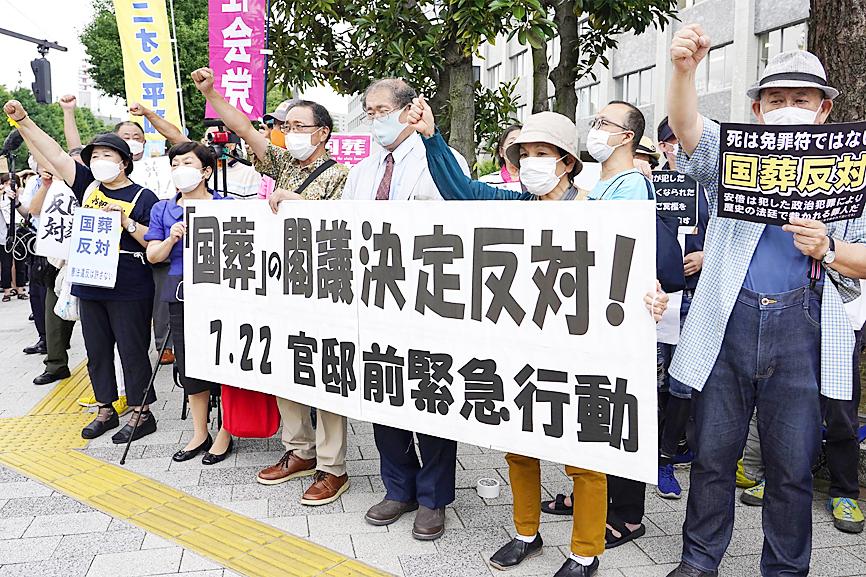Japan’s Cabinet yesterday formally decided to hold a state funeral on Sept. 27 for assassinated former prime minister Shinzo Abe amid a national debate over the plan, which some criticize as an attempt to glorify a divisive political figure.
Abe was gunned down earlier this month during a campaign speech in the western city of Nara, shocking a nation known for safety and strict gun control. The alleged gunman was arrested immediately after the shooting.
Chief Cabinet Secretary Hirokazu Matsuno said a state funeral is appropriate because of Abe’s “distinguished contributions” as the longest-serving Japanese leader and his “outstanding leadership and decisive actions” in broad areas, including economic recovery, the promotion of diplomacy centered on an alliance with the US, and reconstruction following the 2011 tsunami disaster.

Photo: AP
Matsuno said the funeral will be a non-religious ceremony held at the Nippon Budokan, an arena originally built for the 1964 Tokyo Olympics that has since become a popular venue for sports, concerts and cultural events. The government also holds an annual memorial service in the arena every Aug. 15 to mark the end of Japan’s role in World War II.
Foreign dignitaries are to be invited to the funeral, Matsuno said, although further details, including the estimated cost and number of attendees, are yet to be determined.
Japanese Prime Minister Fumio Kishida last week announced plans for a state funeral that some see as a move to stabilize his grip on power by pleasing conservatives who backed Abe.
The plan has received a mixed reaction from opposition leaders and the public. Some oppose the use of tax money on the event, while others criticize Kishida’s governing party for politicizing Abe’s death to glorify him and attempt to end debate over his highly divisive legacy, including his hawkish diplomatic and security policies and revisionist stance on wartime history.
A civic group on Thursday submitted an injunction request asking the Tokyo District Court to suspend the Cabinet decision and budget for the event, saying a state-sponsored funeral without parliament approval contravenes a constitutional right to freedom of belief.
Dozens of protesters stood outside the prime minister’s office yesterday to oppose the decision.
Social Democratic Party chairwoman Mizuho Fukushima said the decision was not based on public consensus, has no legal basis and should be scrapped.
Abe’s private funeral was held at a Tokyo temple and attended by about 1,000 mourners, including lawmakers and business leaders.
Abe’s assassination shed a light on his and his party’s decades-long questionable links to the Unification Church.
The alleged assassin, Tetsuya Yamagami, 41, told police that he killed Abe because of his links to a religious group that he hated. His reported accounts and other evidence suggest he was distressed because his mother’s massive donations to the church had bankrupted the family.

THE TRAGEDY OF PUNCH: Footage of the seven-month-old Japanese macaque has gone viral online after he was rejected by his mother and formed a bond with a soft toy A baby monkey in Japan has captured hearts around the world after videos of him being bullied by other monkeys and rejected by his mother went viral last week. Punch, a Japanese macaque, was born in July last year at Ichikawa City Zoo. He has drawn international attention after zookeepers gave him a stuffed orangutan toy after he was abandoned by his mother. Without maternal guidance to help him integrate, Punch has turned to the toy for comfort. He has been filmed multiple times being dragged and chased by older Japanese macaques inside the enclosure. Early clips showed him wandering alone with

South Korea would soon no longer be one of the few countries where Google Maps does not work properly, after its security-conscious government reversed a two-decade stance to approve the export of high-precision map data to overseas servers. The approval was made “on the condition that strict security requirements are met,” the South Korean Ministry of Land, Infrastructure and Transport said. Those conditions include blurring military and other sensitive security-related facilities, as well as restricting longitude and latitude coordinates for South Korean territory on products such as Google Maps and Google Earth, it said. The decision is expected to hurt Naver and Kakao

Australian Prime Minister Anthony Albanese yesterday said he did not take his security for granted, after he was evacuated from his residence for several hours following a bomb threat sent to a Chinese dance group. Albanese was evacuated from his Canberra residence late on Tuesday following the threat, and returned a few hours later after nothing suspicious was found. The bomb scare was among several e-mails threatening Albanese sent to a representative of Shen Yun, a classical Chinese dance troupe banned in China that is due to perform in Australia this month, a spokesperson for the group said in a statement. The e-mail

MONEY GRAB: People were rushing to collect bills scattered on the ground after the plane transporting money crashed, which an official said hindered rescue efforts A cargo plane carrying money on Friday crashed near Bolivia’s capital, damaging about a dozen vehicles on highway, scattering bills on the ground and leaving at least 15 people dead and others injured, an official said. Bolivian Minister of Defense Marcelo Salinas said the Hercules C-130 plane was transporting newly printed Bolivian currency when it “landed and veered off the runway” at an airport in El Alto, a city adjacent to La Paz, before ending up in a nearby field. Firefighters managed to put out the flames that engulfed the aircraft. Fire chief Pavel Tovar said at least 15 people died, but